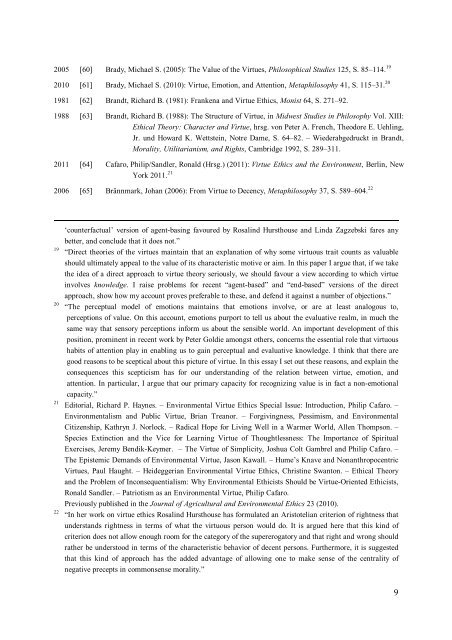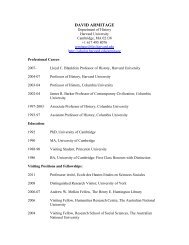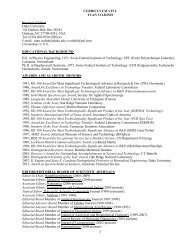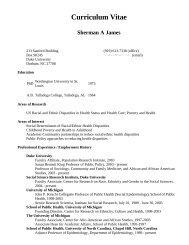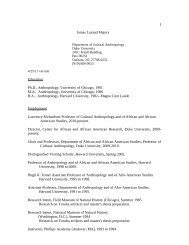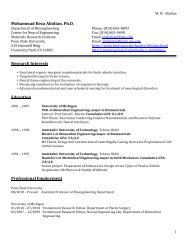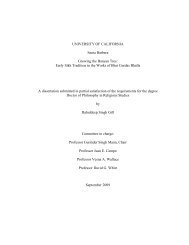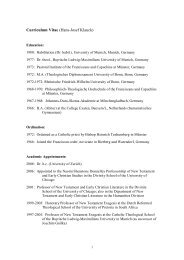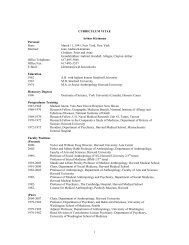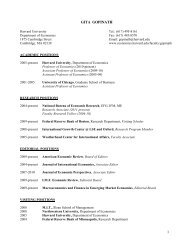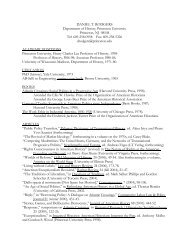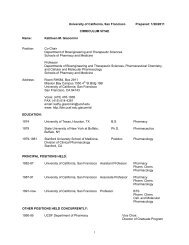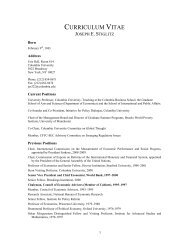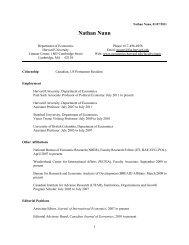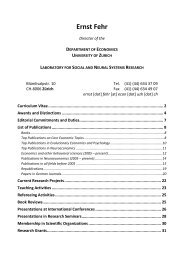Literatur zur Tugendethik Bibliography on Virtue ... - Academic Room
Literatur zur Tugendethik Bibliography on Virtue ... - Academic Room
Literatur zur Tugendethik Bibliography on Virtue ... - Academic Room
- No tags were found...
You also want an ePaper? Increase the reach of your titles
YUMPU automatically turns print PDFs into web optimized ePapers that Google loves.
2005 [60] Brady, Michael S. (2005): The Value of the <strong>Virtue</strong>s, Philosophical Studies 125, S. 85–114. 192010 [61] Brady, Michael S. (2010): <strong>Virtue</strong>, Emoti<strong>on</strong>, and Attenti<strong>on</strong>, Metaphilosophy 41, S. 115–31. 201981 [62] Brandt, Richard B. (1981): Frankena and <strong>Virtue</strong> Ethics, M<strong>on</strong>ist 64, S. 271–92.1988 [63] Brandt, Richard B. (1988): The Structure of <strong>Virtue</strong>, in Midwest Studies in Philosophy Vol. XIII:Ethical Theory: Character and <strong>Virtue</strong>, hrsg. v<strong>on</strong> Peter A. French, Theodore E. Uehling,Jr. und Howard K. Wettstein, Notre Dame, S. 64–82. – Wiederabgedruckt in Brandt,Morality, Utilitarianism, and Rights, Cambridge 1992, S. 289–311.2011 [64] Cafaro, Philip/Sandler, R<strong>on</strong>ald (Hrsg.) (2011): <strong>Virtue</strong> Ethics and the Envir<strong>on</strong>ment, Berlin, NewYork 2011. 212006 [65] Brännmark, Johan (2006): From <strong>Virtue</strong> to Decency, Metaphilosophy 37, S. 589–604. 2219202122‘counterfactual’ versi<strong>on</strong> of agent-basing favoured by Rosalind Hursthouse and Linda Zagzebski fares anybetter, and c<strong>on</strong>clude that it does not.”“Direct theories of the virtues maintain that an explanati<strong>on</strong> of why some virtuous trait counts as valuableshould ultimately appeal to the value of its characteristic motive or aim. In this paper I argue that, if we takethe idea of a direct approach to virtue theory seriously, we should favour a view according to which virtueinvolves knowledge. I raise problems for recent “agent-based” and “end-based” versi<strong>on</strong>s of the directapproach, show how my account proves preferable to these, and defend it against a number of objecti<strong>on</strong>s.”“The perceptual model of emoti<strong>on</strong>s maintains that emoti<strong>on</strong>s involve, or are at least analogous to,percepti<strong>on</strong>s of value. On this account, emoti<strong>on</strong>s purport to tell us about the evaluative realm, in much thesame way that sensory percepti<strong>on</strong>s inform us about the sensible world. An important development of thispositi<strong>on</strong>, prominent in recent work by Peter Goldie am<strong>on</strong>gst others, c<strong>on</strong>cerns the essential role that virtuoushabits of attenti<strong>on</strong> play in enabling us to gain perceptual and evaluative knowledge. I think that there aregood reas<strong>on</strong>s to be sceptical about this picture of virtue. In this essay I set out these reas<strong>on</strong>s, and explain thec<strong>on</strong>sequences this scepticism has for our understanding of the relati<strong>on</strong> between virtue, emoti<strong>on</strong>, andattenti<strong>on</strong>. In particular, I argue that our primary capacity for recognizing value is in fact a n<strong>on</strong>-emoti<strong>on</strong>alcapacity.”Editorial, Richard P. Haynes. – Envir<strong>on</strong>mental <strong>Virtue</strong> Ethics Special Issue: Introducti<strong>on</strong>, Philip Cafaro. –Envir<strong>on</strong>mentalism and Public <strong>Virtue</strong>, Brian Treanor. – Forgivingness, Pessimism, and Envir<strong>on</strong>mentalCitizenship, Kathryn J. Norlock. – Radical Hope for Living Well in a Warmer World, Allen Thomps<strong>on</strong>. –Species Extincti<strong>on</strong> and the Vice for Learning <strong>Virtue</strong> of Thoughtlessness: The Importance of SpiritualExercises, Jeremy Bendik-Keymer. – The <strong>Virtue</strong> of Simplicity, Joshua Colt Gambrel and Philip Cafaro. –The Epistemic Demands of Envir<strong>on</strong>mental <strong>Virtue</strong>, Jas<strong>on</strong> Kawall. – Hume’s Knave and N<strong>on</strong>anthropocentric<strong>Virtue</strong>s, Paul Haught. – Heideggerian Envir<strong>on</strong>mental <strong>Virtue</strong> Ethics, Christine Swant<strong>on</strong>. – Ethical Theoryand the Problem of Inc<strong>on</strong>sequentialism: Why Envir<strong>on</strong>mental Ethicists Should be <strong>Virtue</strong>-Oriented Ethicists,R<strong>on</strong>ald Sandler. – Patriotism as an Envir<strong>on</strong>mental <strong>Virtue</strong>, Philip Cafaro.Previously published in the Journal of Agricultural and Envir<strong>on</strong>mental Ethics 23 (2010).“In her work <strong>on</strong> virtue ethics Rosalind Hursthouse has formulated an Aristotelian criteri<strong>on</strong> of rightness thatunderstands rightness in terms of what the virtuous pers<strong>on</strong> would do. It is argued here that this kind ofcriteri<strong>on</strong> does not allow enough room for the category of the supererogatory and that right and wr<strong>on</strong>g shouldrather be understood in terms of the characteristic behavior of decent pers<strong>on</strong>s. Furthermore, it is suggestedthat this kind of approach has the added advantage of allowing <strong>on</strong>e to make sense of the centrality ofnegative precepts in comm<strong>on</strong>sense morality.”9


